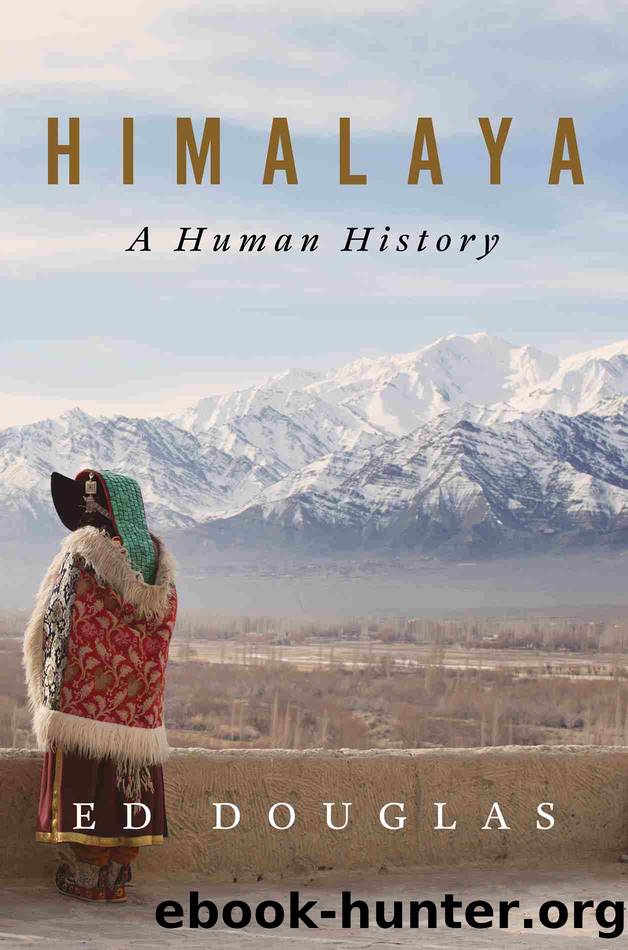Himalaya by Ed Douglas

Author:Ed Douglas
Language: eng
Format: epub
Publisher: W. W. Norton & Company
Published: 2020-11-12T00:00:00+00:00
The publisher Edward Arnold offered St George a good advance to write up their adventures but the article had been enough; Littledale didnât care much who knew what they had done and he slipped quietly beyond the reach of bibliographers. Teresa went on a final expedition to Mongolia and then retired from the expedition life. In January 1928, a few months before she died at the age of eighty-nine, the elderly couple had a small house party for Tibetan friends old and new: Francis Younghusband, who by then had solved the problem of entering Lhasa by kicking down the door, and Sir Charles Bell, the former special ambassador who had lived a year in the city and steered British policy in a more constructive direction. Younghusband also brought two Tibetan friends to meet the Littledales, one of them part of the Lhasa government thirty-three years earlier when St George and Teresa had come so close.
He knew all about us. He said that he thought the risk was too great for any of them to have taken a bribe. It meant forfeiture of land & banishment if discovered. How Willy would have enjoyed it hearing the other side.
The Littledales were exceptional in leaving their story untold. Almost everyone else visiting Tibet in the late nineteenth century published books. The stories they brought back, taken at face value by the public, were often compromised: by a lack of Tibetan, the difficulties of functioning at high altitude in a hostile environment, and often just naked prejudice. Henry Savage Landorâs In Forbidden Tibet was one particularly egregious example: in its excoriation of Tibetans and their way of life, not much more than fantasy. (âThe Lamas are said to have a great craving for human blood, which, they say, gives them strength, genius and vigour.â) Needless to say, the reviewers loved it. âWhy should people write falsehoods about us,â wrote the Tibetan emigré Rinchen Lhamo in the 1920s, fed up with the steady flow of twisted perspectives on her country; âwhy should they write at all of things they do not know?â
In the absence of Tibetan voices, and with proper scholarship on the Himalaya still emerging, it was these versions of Tibet that would have primacy in the public imagination, skewing the worldâs understanding even now. For some, Tibet was a mystical blank on the map, a place about which you could say almost anything because there was almost no one to contradict you. Tibet became an otherworldly place that promised ancient, esoteric answers to a spiritual dislocation provoked in Europe by rapid industrialisation. As Martin Brauen put it in Dreamworld Tibet:
In the late nineteenth century, in non-missionary literature Tibet was able more and more to signify a mountain towering above the sorrows and problems of the world, an island of seekers.
The woman who did more than anyone else to foster this image of Tibet was Helena Blavatsky, the Russian-born occultist and chief spiritual architect of the Theosophical Society, a synthesis of âscience, religion and philosophyâ that would revive a lost and ancient system of knowledge.
Download
This site does not store any files on its server. We only index and link to content provided by other sites. Please contact the content providers to delete copyright contents if any and email us, we'll remove relevant links or contents immediately.
Blood and Oil by Bradley Hope(1246)
Daniel Holmes: A Memoir From Malta's Prison: From a cage, on a rock, in a puddle... by Daniel Holmes(1117)
Ambition and Desire: The Dangerous Life of Josephine Bonaparte by Kate Williams(1084)
Wandering in Strange Lands by Morgan Jerkins(1014)
It Was All a Lie by Stuart Stevens;(940)
What Really Happened: The Death of Hitler by Robert J. Hutchinson(868)
London in the Twentieth Century by Jerry White(844)
Time of the Magicians by Wolfram Eilenberger(842)
The First Conspiracy by Brad Meltzer & Josh Mensch(811)
Twilight of the Gods by Ian W. Toll(811)
A Woman by Sibilla Aleramo(796)
The Japanese by Christopher Harding(795)
Lenin: A Biography by Robert Service(778)
The Devil You Know by Charles M. Blow(777)
Reading for Life by Philip Davis(774)
Cleopatra by Alberto Angela(764)
Twelve Caesars by Mary Beard(764)
1965--The Most Revolutionary Year in Music by Andrew Grant Jackson(714)
The Life of William Faulkner by Carl Rollyson(713)
